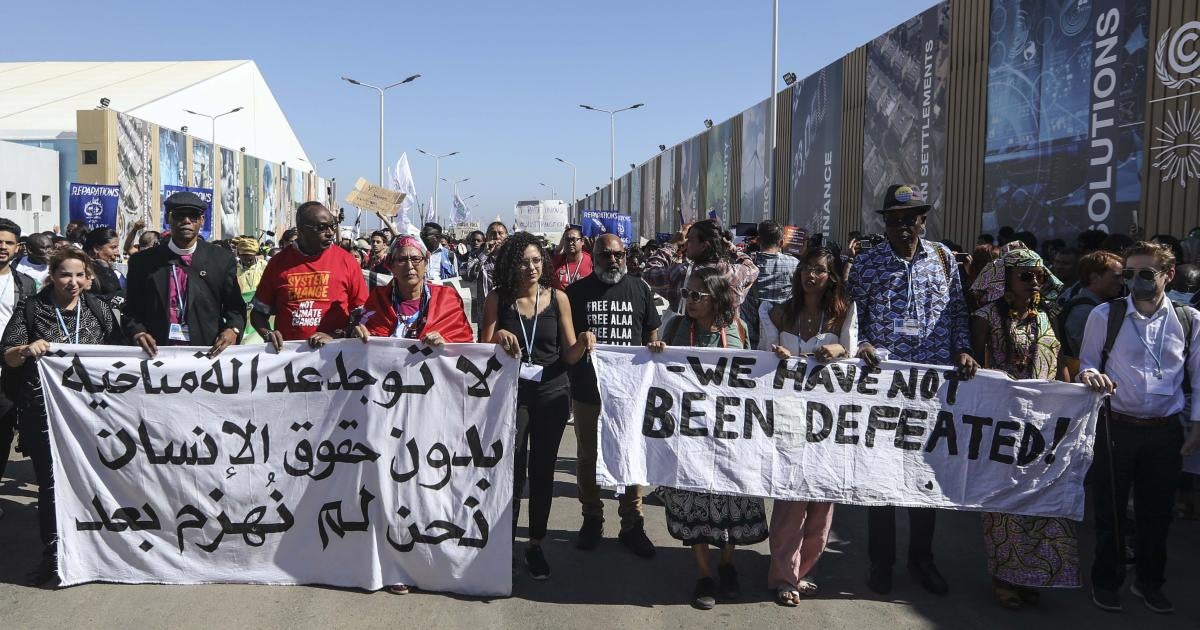
(Beirut) – The Egyptian government failed to ease the ongoing repression campaign against critics in 2022 or repeal laws curtailing basic freedoms, Human Rights Watch said today in its World Report 2023. Meanwhile, the government carried out a concerted whitewashing effort to improve the country’s image without enacting critical reforms, including issuing a presidentially sponsored national dialogue and hosting the COP27 UN climate conference in November.
President Abdel Fattah al-Sisi declared 2022 the “year of civil society,” but key members of civil society faced arbitrary travel bans, asset freezes, and criminal investigations in retaliation for their peaceful activism or criticism. Despite hosting COP27, the government has imposed arbitrary funding, research, and registration obstacles that have debilitated local environmental groups, forcing some activists into exile and others to drop important work.
“In 2022, apart from cosmetic changes, President Abdel Fattah al-Sisi’s government has shown no real political will to end systematic rights abuses against wide segments of society,” said Adam Coogle, deputy Middle East and North Africa director at Human Rights Watch. “Egyptian authorities should understand that no PR campaign will be enough to overshadow the country’s human rights crisis, only an end to repression and genuine reforms will suffice.”
In the 712-page World Report 2023, its 33rd edition, Human Rights Watch reviews human rights practices in close to 100 countries. In her introductory essay, acting Executive Director Tirana Hassan says that in a world in which power has shifted, it is no longer possible to rely on a small group of mostly Global North governments to defend human rights. The world’s mobilization around Russia’s war in Ukraine reminds us of the extraordinary potential when governments realize their human rights obligations on a global scale. The responsibility is on individual countries, big and small, to apply a human rights framework to their policies, and then work together to protect and promote human rights.
Thanks to concerted efforts by Egyptian and international activists, COP27 turned from a PR opportunity for the government to a rare moment of reckoning. Egypt’s abysmal human rights record featured in global headlines before and during the conference. During the conference, the government faced real pressure despite its attempts to curtail local participation.
Between April and November, the authorities claimed they released about 1,000 unjustly detained activists and journalists but human rights groups have documented the arrests of many others including rearrests of some of those released. Prisons are still sprawling with thousands of people detained for their political backgrounds, and the government keeps their numbers secret. The Interior Ministry police and National Security agents continued to forcibly disappear opponents. Egyptian prison authorities and security forces ill-treated and tortured detainees, including with systematic sexual violence to degrade them with near-complete impunity.
In North Sinai, Human Rights Watch published evidence that the Egyptian army and its affiliated militias carried out three extrajudicial executions of shackled or wounded men in custody.
Throughout 2022, Human Rights Watch documented cases in which security forces used digital targeting, based on “debauchery” provisions and the Cybercrime Law, to entrap lesbian, gay, bisexual, and transgender people (LGBT), arbitrarily arrested and detained them based on digital evidence found on their personal devices, and ill-treat them in police custody.
In September 2022, prosecutors summoned three Mada Masr journalists, as well as the chief editor, and charged them with “spreading false news” over a news article. The chief editor was also charged with operating an unlicensed news site. Authorities continued to block access to hundreds of news and human rights websites without judicial orders.
In March 2022, the authorities violated the international legal prohibition on refoulement by deporting 31 Eritreans, including 8 children, after detaining them in poor conditions and denying them access to the United Nations High Commissioner for Refugees (UNHCR) to lodge asylum claims, according to the Refugees Platform in Egypt.








